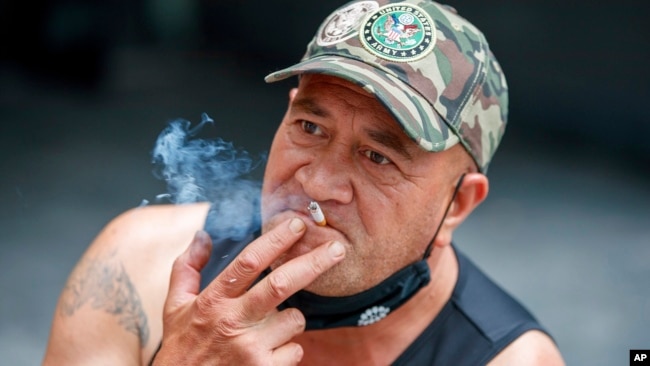さすが、ニュージーランドですね!!
環境保全先進国と呼ばれていますが、またしても、斬新な法案。
電子たばこや加熱式たばこは当面、容認されるようです。
我が国って・・・・・
VOAで英語を学びましょう!!
ニュージーランド、将来の世代にタバコの購入を禁止(和訳)
New Zealand Bans Future Generations from Buying Cigarettes
Dec.15,2022
ニュージーランドは火曜日、2009年1月1日以降に生まれた人は生涯タバコを買えないようにする法律を可決しました。
つまり、タバコを買うための最低年齢はどんどん上がっていくことになります。そして、今から50年後にタバコを買おうとする人は、少なくとも63歳であることを証明する必要があります。この法律に違反した者は、最高で95,000ドルの罰金を科せられる可能性があります。
しかし、ニュージーランドの保健当局は、それよりもずっと前に喫煙者が減っていることを望んでいます。彼らは、2025年までに国内を禁煙にするという目標を掲げています。
この禁止令は、世界でも最も厳しいとされる新しい禁煙法の一部です。この法律では、タバコ製品を販売できる店の数を約6,000から600に減らします。また、喫煙タバコ製品に含まれるニコチンの量も減らされます。ニコチンはタバコに含まれるaddictive中毒性のある成分です。
「使用した人の半分が死亡するような製品の販売を許可する正当な理由はありません」と、アイーシャ・ヴェラル保健副大臣は国会で議員に対し述べました。
さらに彼女は、”何千人もの人々がより健康で長生きし、喫煙によって引き起こされる病気の治療が不要になることで、医療制度は50億ドル改善されるだろう”とも述べています。
ニュージーランドは、先進国の中で成人の喫煙率が最も低い国の一つです。経済協力開発機構、OECD、によると、ニュージーランドの成人の喫煙者数は、過去10年間で半減し、8%になったと言います。また、OECDのデータによると、2021年にはフランスの成人の25%が喫煙しています。
ニュージーランドの先住民族であるマオリ族の喫煙率は依然として高く、約20パーセントが喫煙しています。ヴェラル氏は、新法はマオリ族と非マオリ族の国民の間の平均寿命の差を縮めるのに役立つと述べています。
ほとんどの議員が新法を支持する中、ACTニュージーランド党はこの法案に反対を表明しています。彼らは、多くの小さな店がタバコを売ることができなくなるため、廃業してしまうだろうと述べてます。
ACTのリーダーであるブルック・ヴァン・ヴェルデン氏は、この禁止法は違法な市場を作り出し、問題を引き起こすだろうと言っています。「誰もタバコを吸う人を見たくはないでしょうが、現実には吸う人がいるのです」と彼女は付け加えています。
世界では、ブータンだけがより厳しい禁煙法を持っています。アジアの小国であるブータンは、2010年にタバコの販売を禁止しました。
New Zealand Bans Future Generations from Buying Cigarettes
New Zealand passed a law on Tuesday to set a lifetime ban on buying cigarettes for any person born after January 1, 2009.
This means that the minimum age for buying cigarettes will keep going up and up. And someone trying to buy cigarettes 50 years from now would need to show that they were at least 63 years old. Those who violate the law could face fines of up to $95,000.
But New Zealand health officials hope smoking will decrease well before then. They have stated a goal of making the country smoke-free by 2025.
The ban is part of the new anti-smoking laws that are among the strictest in the world. The law reduces the number of shops that can sell tobacco products from about 6,000 to 600. It also decreases the amount of nicotine permitted in smoked tobacco products. Nicotine is an addictive element in tobacco.
“There is no good reason to allow a product to be sold that kills half the people that use it,” Associate Minister of Health Dr. Ayesha Verrall told lawmakers in Parliament.
She added, “thousands of people will live longer, healthier lives and the health system will be $5 billion better off from not needing to treat the illnesses caused by smoking.”
New Zealand has one of the lowest adult smoking rates among developed countries. The Organization of Economic Cooperation and Development, or OECD, said the number of adult New Zealanders smoking fell by half over the past 10 years to eight percent. And OECD data shows 25 percent of French adults smoked in 2021.
Smoking rates remain higher among the indigenous Māori in New Zealand, with about 20 percent reporting they smoked. Verrall said the new laws would help close the life expectancy gap between Maori and non-Maori citizens.
While most lawmakers support the new laws, the ACT New Zealand party spoke out against the legislation. They said many small stores would go out of business because they would no longer be able to sell cigarettes.
Brooke van Velden, a leader of ACT, said the ban would create an illegal market and cause problems. “No one wants to see people smoke, but the reality is, some will,” she added.
Around the world, only Bhutan has a stricter anti-smoking law. The small Asian country banned cigarette sales in 2010.
Words in This Story
addictive -adj. referring to some thing or some activity that makes you want to keep using it or keep doing it
allow -v. to permit
gap -n. a difference in amount or quality between two things
